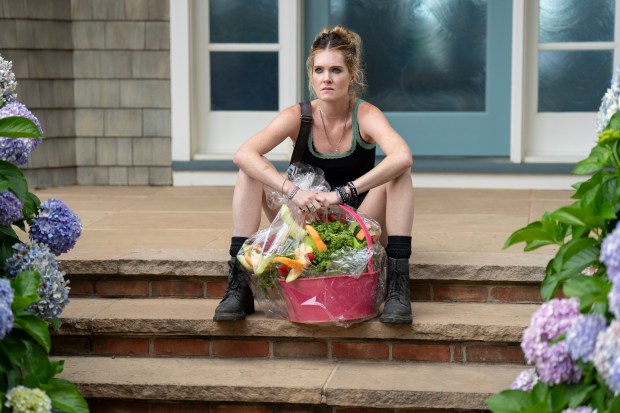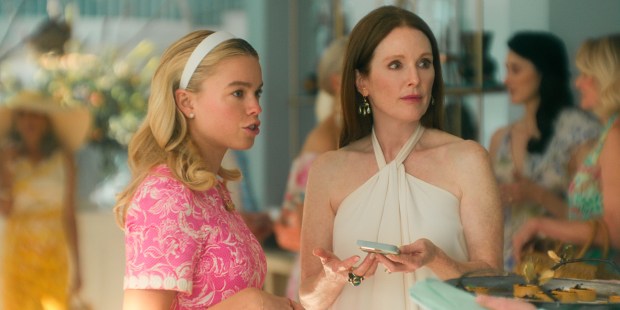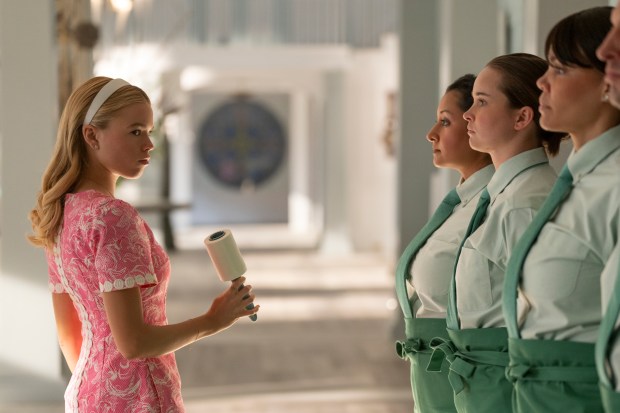I can’t remember the last time a TV series started off with so much promise, only to fall apart in its final act. I suspect that won’t deter audiences from “Sirens,” which premieres on Netflix less than a year after the arrival of “The Perfect Couple,” with which it shares many similarities.
Sprawling beachside estate on the Eastern seaboard? Check. Owned by a middle-aged couple and played by recognizable stars? Check. She’s hyper-poised and controlling? He’s usually found with a joint in hand, agreeably disengaged from his marriage? Check. A beautiful young woman with downmarket origins has invaded their enclave? Check. There’s even the demand for NDAs and a magazine photoshoot at the enormous house, with everyone smiling their rictus grins.
But where “The Perfect Couple” is a murder mystery, “Sirens” is less assured about its genre. Or even what it wants to be about. Is it a dark comedy and social satire taking jabs at the rich? Kind of. At least at the beginning. Is it a drama about personal histories people would rather forget? Sure. Is it an examination of the ways the monied class functions as a cult? “Sirens” certainly suggests it’s going in that direction, only to lose its nerve. Despite a decent set-up, the series lacks narrative direction and feels like a chaotic attempt to just get anything on the page in time for filming, satisfying storytelling (or emotional logic) be damned.
Created by Molly Smith Metzler and based on her 2011 play “Elemeno Pea,” the story centers on the ultra-wealthy Kells, played by Julianne Moore (as Michaela) and Kevin Bacon (as Peter), and the DeWitts, estranged sisters who come from far more humble origins, played by “The White Lotus’s” Meghann Fahy (as Devon) and “House of the Dragon’s” Milly Alcock (as Simone).
Their paths intersect because Simone is Michaela’s personal assistant. An effective and demanding taskmaster, Simone is hated by the other members of the household staff because she treats them like minions. (They have a group chat grousing about her.) Simone exists in a strange netherworld, where she is there in a work capacity, but unlike the maids and the gardeners, she enjoys an elevated status that includes a lovely suite in the house that includes an enormous closet of preppy clothing courtesy of Michaela. This has convinced Simone that she’s somehow escaped the more sordid details of her upbringing, allowing her to remake herself into someone from a different social class. Michaela does little to discourage this, treating Simone like an employee one moment, and her best friend the next, crawling into bed with her at night when she can’t sleep.
“We should sext Peter and let him know I’m looking forward to some husband-and-wife time tonight,” Michaela says. OK, good idea, comes the unfazed reply, and then Simone helps her take some selfies and types out a text. “Say something dirty but not too dirty,” Michaela instructs her.
Meanwhile, in the grubby streets of Buffalo (hey, what did Buffalo do to deserve this!), Simone’s older sister Devon is getting home one morning after her second DUI. The character is coded as “bad” because she wears combat boots, smokes and wears dark eyeliner applied with a heavy hand. It’s all production-designed window dressing. She’s just someone who grew up working class and has remained working class, unlike her sister, who has transformed into a Barbie doll.
Devon lives with her father (Bill Camp), who is in early stages of dementia and requires considerable looking after. Devon wants Simone to come home and share the load, but Simone has been ghosting her for the last six months. Fed up, Devon travels hundreds of miles to confront her sister at the palatial home where she works, and here’s how Simone is informed of Devon’s arrival at the mansion’s doorstep: “There’s a transient person at the house asking for you. She’s carrying hot garbage. She says she’s your sister.”
Devon is unimpressed by the surroundings: “What is this place and why does everyone look like an Easter egg?” Devon also finds Michaela and Simone’s co-dependence creepy. A clash of cultures — high and low, fake and real — is quickly established and there are many compelling ways for the story to go. And yet …
The sisters have some traumatic secrets that Simone would prefer stay buried, whereas Devon is trying to shake her sister free from the obsession she has with the lady of the house. The sisters’ backstory is gradually revealed and becomes increasingly dark. It’s a discordant shift from the show’s earlier, fizzier tone. Suddenly “Sirens” wants you to take these people seriously. What initially feels like a sharp-elbowed skewering of the rich devolves into a soapy mess. It’s vaguely hinted — and then abruptly forgotten — that Michaela might actually be Simone’s mother, but it amounts to a lot of poorly written narrative misdirection, and the only reason I mention it is because the structure of this series is so haphazard, it can’t even incorporate a few red herrings in ways that make sense.

Even so, Moore is doing some very funny work here in the early going, greeting Devon with a perfectly serene look on her face that conveys a disciplined lack of anything real or authentic. She can not abide by this intruder’s presence but will go to great lengths to avoid showing that. She is forever masking a deeply insecure and manipulative personality and has an almost hypnotic effect on the other women around her, “friends” who she has remade in her image and who follow after her like little Stepford wife ducklings.
Nothing is as it seems. But, boy, wealth really does gloss over a lot. There’s something menacing about Michaela’s hypnotic power over everyone, but really: It’s just the money. And while that may be a caricature, it’s an effective one. That’s true of Bacon’s character as well, as a man who has everything but remains unsatisfied — and blames it all on his wife.
There’s a shift in the second to last episode when Michaela suddenly becomes not ridiculous or ominous, but self-aware and human and someone who very clearly sees what a fraud her life has been. The show suddenly wants you to have compassion for her. None of this is her fault! She’s a victim too! (She is not a victim.) It’s a pivot that comes out of nowhere and “Sirens” strains to make a point about the cynicism and opportunism that is everywhere in these luxurious settings, but it doesn’t work because not enough groundwork — or at least, not the right kind of grounwork — has been laid leading up to it.
I’m unfamiliar with Metlzer’s play that is the show’s source material, but in a review from 2012, Variety called it a “minor contribution to American class warfare” and pegged similar issues with the story’s non-arc: “(Metzler) has a trio of proles suffer under the chaotic lifestyles of the rich and feckless, then strains after an eleventh hour stab at poignancy.”
The series has so much escapist potential in its initial episodes, poking at the absurdities of abundant wealth and ladling in so much silly foreboding, only to squander it because the series is unable to create anything resembling an emotional payoff.
“Sirens” — 2 stars (out of 4)
Where to watch: Netflix

Nina Metz is a Tribune critic.





